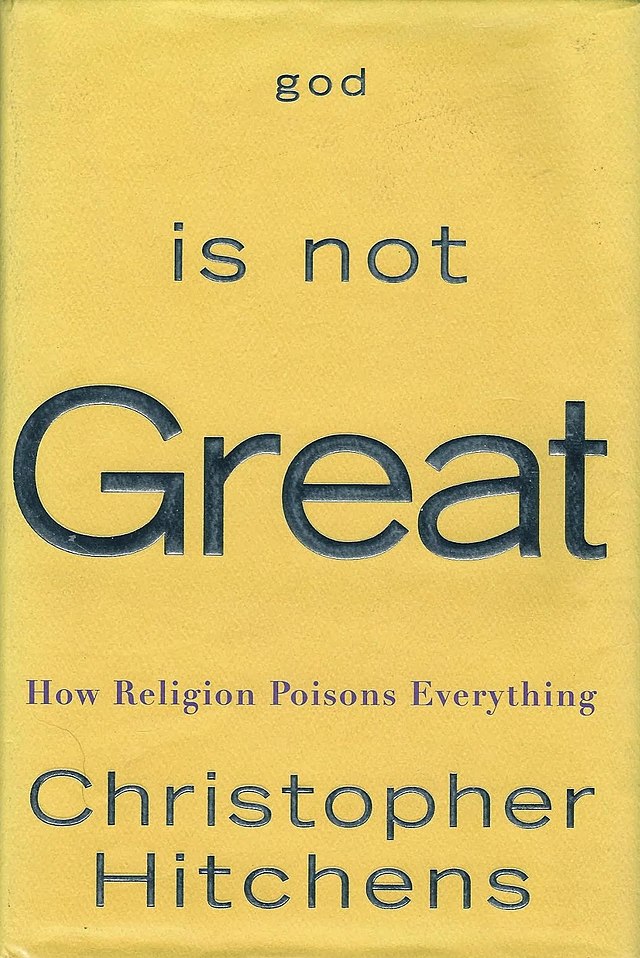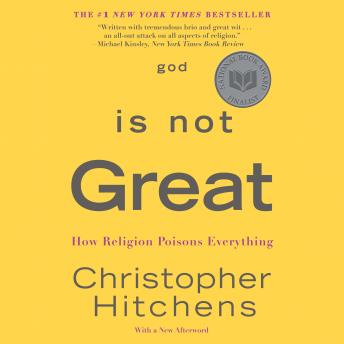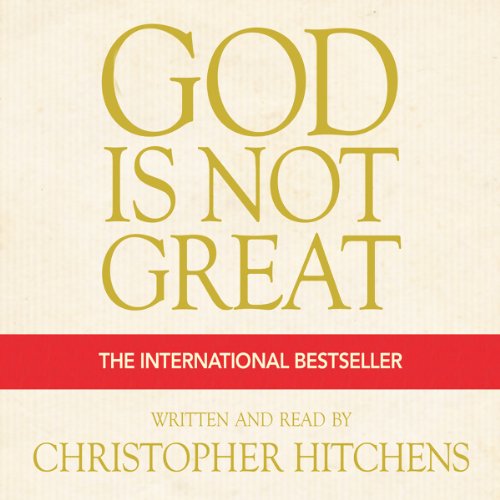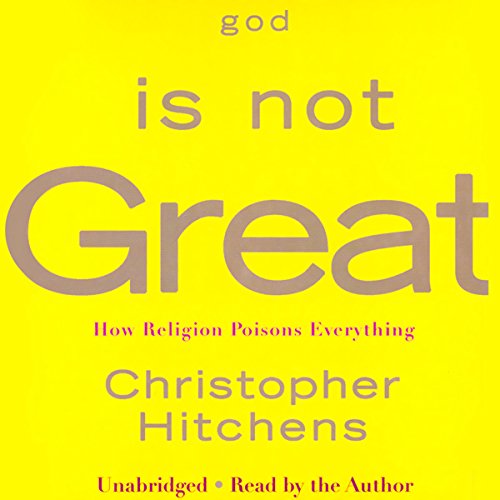Christopher Hitchens’ audiobook “God Is Not Great” critiques religion’s role in society. It argues that religion is harmful and irrational.
Christopher Hitchens, a renowned intellectual, presents a compelling critique of religion in his audiobook “God Is Not Great. ” He challenges the notion that religion brings moral or societal benefits. Instead, Hitchens argues that it promotes ignorance and conflict. His narrative is bold, provocative, and meticulously researched.
Listeners are taken on a journey through historical and contemporary examples of religion’s detrimental effects. This audiobook is a thought-provoking exploration of faith and its impact on human progress. Hitchens’ eloquent prose and sharp wit make it a must-listen for those interested in the intersection of religion, politics, and culture.
Introduction To ‘god Is Not Great’
‘God Is Not Great’ is a powerful audiobook. It challenges the core beliefs of religion. Christopher Hitchens uses sharp wit and strong arguments. This audiobook is both engaging and thought-provoking.
The Provocative Premise
The main idea of ‘God Is Not Great’ is simple. Hitchens argues that religion is harmful. He believes it causes more harm than good. He provides many examples from history. His arguments are clear and precise.
Hitchens questions the validity of religious texts. He examines the contradictions within them. He also points out the negative effects of religious institutions. He makes a compelling case against religion.
Christopher Hitchens: The Author
Christopher Hitchens was a renowned writer and speaker. He was known for his sharp intellect and wit. Hitchens wrote many books on various topics. His writing style is engaging and direct.
Hitchens had a unique perspective on religion. He was an outspoken atheist. He often debated religious leaders. His arguments were well-researched and logical. Hitchens was not afraid to challenge popular beliefs.
He had a talent for making complex ideas simple. This makes ‘God Is Not Great’ accessible to many. His passion for truth shines through in this audiobook.
The Audiobook Experience
Christopher Hitchens’ God Is Not Great audiobook offers an immersive experience. Listening to Hitchens’ words brings his arguments to life. This medium adds another layer to the text.
Narrative Voice And Tone
The audiobook features Hitchens’ own voice. His authoritative tone makes the content engaging. Hitchens’ delivery is clear and compelling. He uses pauses effectively to emphasize key points.
The tone is conversational yet assertive. This style keeps listeners hooked. The audiobook captures his passion and wit. Hearing his voice adds depth to his arguments.
Comparing Audio To Print
The audiobook and print versions offer unique experiences. Each has its own merits. Here’s a comparison:
| Aspect | Audio Version | Print Version |
|---|---|---|
| Narration | Author’s own voice | Silent reading |
| Engagement | High due to voice intonation | Varies by reader |
| Convenience | Listen anywhere | Requires focus |
| Experience | Immersive and dynamic | Reflective and personal |
Both versions have their strengths. The audiobook is great for multitasking. You can listen while driving or exercising.
The print version allows for deeper reflection. You can take notes and re-read sections. Each format offers a unique way to engage with Hitchens’ work.
Religion Critiqued
Christopher Hitchens’ audiobook, God Is Not Great, offers a profound critique of religion. Hitchens, a masterful orator, dissects religious beliefs with sharp wit and deep insight. His arguments are compelling and thought-provoking. He challenges the core tenets of many faiths.
Monotheistic Religions Under Scrutiny
Hitchens focuses intensely on the three major monotheistic religions: Christianity, Islam, and Judaism. He questions their historical roots and moral teachings. He argues that these religions have caused more harm than good. Hitchens highlights instances where religion has fueled conflict and oppression.
He examines the inconsistencies in their holy texts. He points out contradictions that many believers overlook. For example, he discusses the differing accounts of creation in the Bible. He also critiques the portrayal of women in these texts.
Contradictions And Paradoxes Highlighted
Hitchens identifies numerous contradictions in religious doctrines. He argues that these contradictions undermine the credibility of religious beliefs. For instance, he questions the concept of an all-loving God allowing suffering. He also critiques the paradox of free will versus divine omniscience.
He uses historical and contemporary examples to support his points. He discusses the paradoxes within religious practices and rituals. Hitchens’ arguments are clear, concise, and backed by evidence.
| Religious Concept | Contradiction |
|---|---|
| All-Loving God | Existence of Evil and Suffering |
| Free Will | Divine Omniscience |
| Creation Accounts | Different Versions in Holy Texts |
Hitchens’ critique is not limited to theology. He also examines the social and political implications of religious beliefs. He argues that religion often impedes scientific progress and rational thought.
His analysis is both rigorous and accessible. He uses simple language and relatable examples. This makes his arguments easy to understand, even for those unfamiliar with religious texts.

Historical And Contemporary Analysis
Christopher Hitchens’ audiobook, God Is Not Great, has stirred significant conversations. The book challenges religious dogma and its influence on society. Hitchens argues that religion hampers progress and morality. His views have sparked debates and provoked thought among listeners.
The Morality Debate
Hitchens questions the link between religion and morality. He argues that moral values can exist without religious teachings. According to him, religion sometimes justifies immoral acts. This raises questions about the true source of morality.
Some key points include:
- Moral values can be independent of religious beliefs.
- Religion has been used to justify wars and violence.
- Secular societies often show high moral standards.
Secularism And Progress
Hitchens believes secularism promotes progress and freedom. He argues that secular societies are more open to science and innovation. Secularism allows for a more rational and evidence-based approach to issues.
| Aspect | Religious Societies | Secular Societies |
|---|---|---|
| Scientific Progress | Often restricted by dogma | Encouraged and supported |
| Personal Freedom | Limited by religious rules | More extensive and protected |
| Education | May include religious bias | Focuses on critical thinking |
Hitchens’ arguments suggest that secular societies can achieve more. They can focus on human rights, equality, and scientific advancements.
Impact On Society And Morality
In Christopher Hitchens’ audiobook God Is Not Great, the debate between science and religion takes center stage. Hitchens argues that scientific discoveries and theories provide more credible explanations for the universe than religious beliefs.
Evolutionary Theory
The theory of evolution challenges many religious beliefs. Charles Darwin’s theory explains the diversity of life through natural selection. It shows how species adapt over time to their environment.
Hitchens emphasizes that evolution is based on evidence. Fossil records and genetic research support this theory. This evidence contradicts the idea of creationism, which many religions teach.
Scientific Discoveries
Scientific discoveries have transformed our understanding of the universe. For example, the heliocentric model of the solar system displaced the Earth-centered view. This challenged religious teachings of the time.
Hitchens highlights how science offers testable and falsifiable hypotheses. Unlike religious doctrines, scientific theories can be proven wrong. This makes science a more reliable method of understanding the world.
Let’s look at some key scientific discoveries:
| Discovery | Impact |
|---|---|
| Heliocentric Theory | Shifted the understanding of our solar system. |
| Germ Theory | Revolutionized medicine and hygiene. |
| Genetics | Explained heredity and biological variation. |
These discoveries illustrate the power of scientific inquiry. They show how science can challenge and refine our understanding of the universe. In the audiobook, Hitchens makes a compelling case for the supremacy of science over religion.
Science Vs. Religion
Christopher Hitchens was a masterful debater. His book “God Is Not Great” sparked many discussions. The audiobook version brings his arguments to life. Here, we explore his debates and interviews.
Notable Public Appearances
Hitchens appeared on various platforms to discuss his book. He debated religious leaders and scholars. These debates were intense and captivating.
| Event | Date | Opponent |
|---|---|---|
| Intelligence Squared Debate | October 2007 | Alister McGrath |
| Notre Dame University | April 2010 | John Lennox |
| ABC’s QA | November 2009 | George Pell |
Reactions From Religious Scholars
Many religious scholars reacted strongly to Hitchens’ views. They challenged his ideas on various platforms.
- Alister McGrath: He debated Hitchens on science and faith. McGrath argued for the compatibility of the two.
- John Lennox: He focused on the moral arguments. Lennox believed in the necessity of God for morality.
- George Pell: He discussed the historical aspects of religion. Pell defended the role of religion in history.
These reactions enriched the discussions. They provided different perspectives on faith and atheism.
Hitchens’ Debates And Interviews
Christopher Hitchens’ ‘God Is Not Great’ audiobook has sparked wide debate. The book challenges religious beliefs. It has received varied responses from readers and critics.
Academic And Theological Responses
Academics and theologians have had strong reactions. Some praise its bold arguments. Others criticize its lack of depth.
| Academic Response | Theological Response |
|---|---|
| Support for critical thinking | Called it blasphemous and offensive |
| Considered well-researched by some scholars | Claimed it lacks theological understanding |
Book Reviews And Sales
The book has seen impressive sales. Reviews are mixed but often passionate.
- Positive reviews highlight its eloquence and wit.
- Negative reviews focus on its controversial stance.
- New York Times Bestseller list for several weeks.
- High ratings on Amazon and Goodreads.
Criticism And Praise For The Book
Christopher Hitchens’ audiobook, God Is Not Great, has left a lasting impact. His voice and arguments resonate with many listeners. Hitchens’ style and wit make complex ideas accessible. Let’s explore his legacy and influence.
Contribution To Atheist Discourse
Hitchens made a significant contribution to atheist discourse. He tackled religious beliefs with courage and clarity. His work influenced many to question and think critically.
- Hitchens’ arguments are logical and well-structured.
- He used historical and scientific evidence effectively.
- His wit and humor engaged a wide audience.
Hitchens’ debates with religious figures are still widely viewed. His ability to articulate his points made a lasting impression. Hitchens’ legacy continues through his writings and recordings.
Continued Relevance In Religious Debate
Hitchens’ work remains relevant in today’s religious debates. His points are often referenced in discussions about faith and reason. Many find his arguments compelling and thought-provoking.
- Hitchens questioned the moral authority of religion.
- He highlighted the conflicts between science and faith.
- His critiques of religious texts are still debated.
The audiobook format of God Is Not Great makes his ideas accessible. Listeners can hear his passion and conviction in every word. This keeps his influence alive and strong.
Hitchens’ Legacy And Influence
Christopher Hitchens’ audiobook, God Is Not Great, provides a captivating exploration of religion’s impact. This section delves into Hitchens’ personal journey and its influence on listeners’ beliefs.
Hitchens’ Personal Journey
Hitchens shares his experiences, shaping his views on religion. He recounts childhood memories that made him question faith. These stories create a deeper connection with listeners.
Hitchens’ time as a journalist exposed him to various cultures. This exposure reinforced his skepticism about religion’s role. His reflections provide insight into his transformation from believer to critic.
Influence On Personal Belief Systems
Listeners often find Hitchens’ arguments compelling. Many share their stories of how the audiobook changed their views.
Consider the following examples:
| Listener | Reflection |
|---|---|
| John | Questioned long-held beliefs and embraced atheism. |
| Sarah | Found a new perspective on moral values. |
These personal anecdotes highlight the audiobook’s powerful impact. It encourages critical thinking and self-reflection.
- Critical Thinking: Listeners question religious doctrines.
- Self-Reflection: Evaluates personal beliefs and values.
The audiobook continues to inspire and challenge belief systems. Its influence remains significant for many individuals.


Conclusion
Christopher Hitchens’ “God Is Not Great” audiobook offers a thought-provoking critique of religion. Engaging and insightful, it challenges traditional beliefs. Listeners will find compelling arguments and sharp wit throughout. This audiobook is a must-listen for anyone interested in atheism and religious critique.
Dive into Hitchens’ sharp analysis and explore new perspectives.



